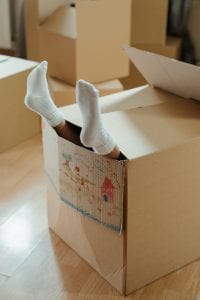With Christmas approaching, I know we’re likely to get an influx of new toys in our house. I’ve been on a lengthy decluttering journey, but it’s no easy task, and it never seems to end. Now, I’m no Marie Kondo. Not a single person who walks into my home and observes the state of my house would ever confuse me for someone who has perfected the art of simplifying. But I do try. Part of this effort includes teaching my son about the importance of donating.
The first time I tried to clean out my three-year-old son’s overwhelm of toys, I did so when he wasn’t home, picking out a couple of toys he hadn’t played with in months. I was positive he wouldn’t notice them missing. I hid the toys in my closet for a month, then moved them to the bottom of a donation box. The day I packed the boxes up to bring them out, my son pointedly asked multiple times for one of the toys I was preparing to donate.
Not my best parenting move.
I tried to explain the toy’s fate, but it led to a meltdown, and while I normally refuse to give in to tantrums, I felt awful about trying to sneak a toy away from him. It was not my best parenting move. We rescued the toy, and I vowed I wouldn’t donate in secret anymore.
But how do you make a toddler understand the importance of donating? I tried to explain that there are some boys and girls who don’t have any toys, but he has so many, and wouldn’t it be nice to share and donate some of the ones he doesn’t play with anymore! He responded positively but with the insistence that those other boys and girls “donate” his toys right back to him when they were done playing.
We’ve since been through several rounds of donations and have continued to patiently answer his questions and gently correct his understanding of where his toys are going or why we choose to do this. Here’s how I handle decluttering and donations with a toddler:
1. Tackle The Throwaways
With my son’s help, I try to regularly go through the toy boxes and take out the broken toys, the broken-off pieces of toys that are still playable, or what I consider “junk” toys: kids’ meal trinkets, cheap Mardi Gras catches, etc. He usually likes to help me find the broken pieces, but if he puts up a fight, I remind him that we don’t keep broken toys that can’t be fixed, and he understands. This decluttering act keeps the toy boxes cleaner and my stress levels lower.
2. Play the Long Game
I’ve found that asking my son to pick just one toy to donate at a time is way easier than asking him to give up a couple. Picking one toy to donate on a Monday and one toy to donate on a Friday feels less intrusive than asking him to donate two toys on that Monday. Even though I think of myself as an efficient person who gets stuff done at once, I consider this playing the long game that ultimately reaches my goal.
3. One Last Time
The most successful method I use to encourage donating toys is telling my son we’re going to play with the toy that he picked one last time and then tell it goodbye. I think it gives him a sense of closure. Instead of moving the toy directly from his room to a donation box and feeling like it’s suddenly gone forever, he gets the rest of the day to play with it as much as he wants– even if he hasn’t touched it in months– and then he decides when he’s done and is ready to let it go. I talk cheerfully about how much fun that was and how exciting it will be for someone else to have fun with it, and then he puts the toy in the box himself. We wave goodbye, and then I pack it up (and make sure he doesn’t see it again before I have the chance to move it out). We haven’t had any tears over a toy that we said goodbye to this way.
Ultimately, I don’t want him to associate donating toys with loss and sorrow, but with responsibility– a habit where he understands it is a joy and not a burden to care for others and share our blessings. We’ve set boundaries about what special toys will never be donated, but he does understand now that I will regularly ask him to pick something he no longer plays with so that it can find a new home. I make sure that he sees me donating my own things, and he helps me sort through the baby’s clothes to donate, so he knows it’s a family affair. I hope these tips are helpful if you’re looking to get your kids involved in donating and decluttering!

















